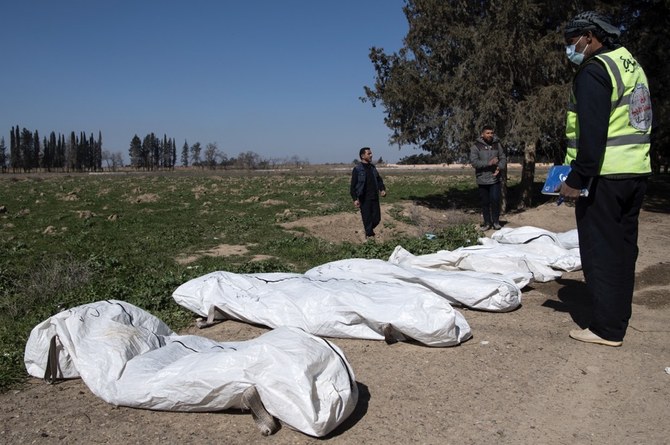CHICAGO: A panel of experts on Monday acknowledged that the process of pursuing justice for violations of international humanitarian law and human rights during the war in Syria faces many hurdles, and even though evidence of such crimes continues to mount it could take years for alleged perpetrators to be brought to trial.
The US Institute for Peace organized the meeting, attended by Arab News, to examine the effectiveness of the International, Impartial and Independent Mechanism, which was established by the UN in 2016 to collect, preserve and analyze evidence of violations of international humanitarian law and human rights in Syria.
The participants said there are ways to overcome the hurdles but it could be a lengthy process.
“We don’t have a lot of accountability mechanisms or venues waiting,” said Mohammad Al-Abdallah, founding director of the Syria Justice and Accountability Center, which investigates and collects evidence about alleged war crimes.
“We have a lot of good efforts by some member states, by civil society, by the IIIM, by the Commission of Inquiry. But we have a lot of crimes that remain and are untouched.”
March next year will mark the 12th anniversary of the uprising in Syria that sparked a civil war that has divided the country, resulting in more than 350,000 deaths, many of them among civilians, and injured many more. In addition, 7 million people have become refugees, displaced within Syria or in other countries.
Al-Abdallah, who was imprisoned in Syria and tortured by the regime, said a combination of tragedies and war crimes in the country has resulted in the creation of a new process for pursuing efforts to ensure the individuals responsible are eventually held accountable.
“Looking for accountability efforts is not really something easy because Syria is not a member state of the Rome Statue so the ICC (International Criminal Court) could not practice jurisdiction over the crimes committed in Syria,” he said.
The Rome Statute established four core types of international crimes: genocide, crimes against humanity, war crimes, and the crime of aggression.
“The Syrian government doesn’t have a great track record, or trust or even credibility, to open its own investigations inside Syria and have any domestic procedures,” Al-Abdallah told the panel.
“Although (President Bashar) Assad announced (the launch of) a commission of inquiry at the beginning of 2012, it didn't lead anywhere. It disappeared.
“The number of people killed under torture … was astonishing — how many people ended up in detention facilities, the systematic way of killing them, the systematic way of torturing people, and also the systematic way of moving dead bodies to be buried elsewhere.”
Al-Abdallah said the alternative to the ICC is the process of “universal jurisdiction.” This is a legal principle that recognizes that some crimes are so serious that the duty to prosecute them transcends borders. But it is “limited in several ways,” he said, because of diplomatic immunity and the inability to prosecute heads of state.
He noted that even the US has previously undermined universal jurisdiction as a process, to protect American soldiers accused of killing innocent civilians in Iraq and Afghanistan.
The IIIM was created after the UN Security Council was unable to pursue a criminal investigation into alleged regime crimes committed during the conflict in Syria because the move was blocked by Russia’s power of veto.
“Since the UN General Assembly established the International, Impartial and Independent Mechanism in 2016, this first-of-its-kind investigative body has played a critical role in collecting and analyzing evidence of crimes in Syria,” said US Institute for Peace Vice President Michael Yaffe in his introduction to Monday’s event.
“This work has only become more essential as parties to the conflict have continued to subject civilians to indiscriminate attacks, unlawful detention, torture and enforced disappearance.
“Despite progress investigating and prosecuting suspected perpetrators under the principle of universal jurisdiction, accountability for international legal violations in Syria remains elusive.”
Catherine Marchi-Uhel, chairperson of the IIIM, said that despite the challenges, the process of collecting war crime data is beneficial and it could result in prosecutions and put pressure on the Syrian regime to stand accountable for its actions.
She said the IIIM collects, consolidates, preserves and analyzes evidence of violations of international humanitarian law and human rights violations in Syria, and works to share that data, when possible, to help families determine the events that led to the disappearance of their loved ones.
Marchi-Uhel said the IIIM has “received 229 requests for assistance from competent jurisdiction, which relates to 187 different investigations.”
Beth Van Schaack, ambassador-at-large for Global Criminal Justice at the US Department of State, said that efforts are being made to secure ICC jurisdiction for investigations into war crimes in Syria.
Al-Abdallah noted that US policies on Syria are limited to sanctions, and that efforts are being made to get the Syrian regime to assist in identifying the status of those who have disappeared.




























